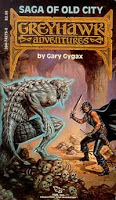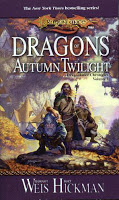I’m pretty sure I’m in the minority on this one, but I happen to really like novels set in RPG worlds, as a general concept.
That’s not to say that I think all RPG novels are inherently good. Just look no further than the hated Rose Estes Greyhawk books from the mid-1980’s, with all their explicit furry-sex, magic daggers killing demigods, and other inanities. But some novels are quite good, both as novels, sourcebooks for the settings in which they are set, and as guides for how some aspects of those settings can be used.
It should come as no surprise that I’m a huge fan of the Gary Gygax “Gord the Rogue” novels, although their utility as sources of information regarding the World of Greyhawk drops as you reach the last couple of books (mainly because Gygax had left TSR by that time, and the books depict the destruction of that setting). But I was also a fan of the Forgotten Realms books, at least the early ones, and, at the risk of really blowing my OSR cred, I liked the Icewind Dale trilogy when it first came out. The Dragonlance novels were excellent introductions to the setting as well, which should come as no surprise, as the whole setting was built around the fulfillment of novel-like story-arcs.
Where RPG novels don’t work is as tools to “advance the setting”, which is a practice with which I’m not happy no matter how it’s done. But to flesh out a setting, I like ’em, as long as they’re halfway well done.











I like rpg novels as stories that occur in the setting, but not as stories that become the setting.
I liked the Gord books that I’ve read so far. I liked the first two Dragonlance trilogies. I liked Spellfire. In all those cases, I would probably have been happier if they hadn’t been D&D novels. But then, I might never had read them otherwise.
The exception would be parts of Spellfire that actually followed the rules.
I found Quag Keep interesting, but I don’t know that I’d say that I liked it.
The other D&D novels I’ve read I didn’t like. I don’t recall reading any RPG novels based on other systems.
I enjoyed the first two DragonLance trilogies as well. I like the early Drizzt stories, as well as RA Salvatore's Cadderly the Cleric series.
I haven't read any of the later D&D books, so I can't say iffn they are good or not.
I enjoyed the Gord books, as well as the Dragonlance novels (I couldn't get past the second trilogy either –that's when they started multiplying like rabbits!).
The original Thieves' World novels were great for inspiration and characters. Plus, none of my players had read them at the time!
When Chaosium came out with their Thieves' World boxed set, I had to get it. The books' characters were great to NPC because they were so well written.
Ciao!
GW
I enjoyed the Gord books as well – they gave me a better sense of how Gygax envisioned things working – sort of like a very long example of play. They were also jolly good fun from an adventure fiction point of view.
I enjoyed the Dragonlance books as an eleven year old boy! And the description of the 'modules' at the back of the book were exciting enough for me to go and buy the Mentzer Red box. I tried to read them again a couple of years ago… I think my tastes have moved on a bit since!
I had completely forgotten about Thieves' World. But unless I'm mistaken, didn't the books come out first, and get turned into an RPG setting afterward?
They were great, as I recall, especially the first couple, before all the authors in the "shared setting" really had developed a consensus on just what the place was like.
Yeah, TW were books before a game setting. I guess they don't count; I was putting the cart before the horse.
Advancing the setting through books gets into that marvelously grey area, similar to what is being talked about on Grognardia about the Traveller game.
Setting gets rebooted, in this case, by novels. Now, older game material is obsolete without upgrading it to what is now the accepted norm. GM's and players feel cheated because fate is decided for them rather than by their own characters' actions.
The eternal now setting is preferable. It isn't like fleshing out of some areas and characters can't be done. Sure for ambiance, NPCs, plot hooks, etc.
It's like a new director getting involved in a popular franchise. He wants to make it his version with his stamp on it. Sometimes ego overides the spirit of entertainment.
Ciao!
GW
I enjoyed Dragonlance and the modules that came out too.
The only problem I had was everyone was reading them! I would run the modules and change a few elements and then have everyone pointing fingers at me, saying "No, That didn't happen that way!" I would answer, "Right, it hasn't because you haven't played it." Just try explaining creative license to some players!
Considering my preferred setting is Star Wars, I know all about how books (and movies, of course) can affect a game universe. Luckily for me, my campaign was established in the early 90s, before the slew of expanded universe stuff hit.
As much as I enjoy novels (or movies!) as a way to set up a universe, there comes a point (I think), when the GM and players just have to put their collective foot down and say "From this point out, we make our OWN continuity". Otherwise, you're always going to be playing catchup to another person's concept of 'your' universe.
I used to like the Dragonlance books quite a bit. I'd never played any sort of game on them, and had honestly never heard of it until I started reading up on the OSR. Go figure.
I also liked a couple of the Forgotten Realms books, but that's nothing to write home about. I think I read in total maybe three of them. Not a whole lot to base an opinion on.
As I got into D&D in the late 80s, the novels were an essential part of the experience. I devoured as many as I could, and enjoyed them all at the time (even the wretched Rose Estes stuff). The first two Dragonlance trilogies and RA Salvatore's stuff are the stand-outs. And I always have time for Ed Greenwood, simply because it's authentic Forgotten Realms.
I've many fond memories of Dragonlance novels, and a few Forgotten Realms. I always felt that sessions that occurred parallel with written fiction, with the possible crossovers at points and brief flashes of 'hey, I know that guy, he's the Duke of…' between players as they are driven inexorably away to something more important worked well.
I'm with Joseph on this post. Gord, DL, early FR. All good stuff. Then they all go off the tracks fast.